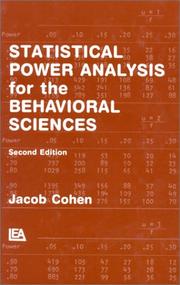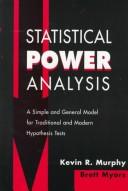| Listing 1 - 6 of 6 |
Sort by
|

ISBN: 0805802835 1134742770 1134742703 0203771583 9780805802832 9780203771587 Year: 1988 Publisher: Hillsdale (N.J.): Erlbaum, Lawrence, Associates,
Abstract | Keywords | Export | Availability | Bookmark
 Loading...
Loading...Choose an application
- Reference Manager
- EndNote
- RefWorks (Direct export to RefWorks)
Statistical Power Analysis is a nontechnical guide to power analysis in research planning that provides users of applied statistics with the tools they need for more effective analysis. The Second Edition includes: * a chapter covering power analysis in set correlation and multivariate methods; * a chapter considering effect size, psychometric reliability, and the efficacy of ""qualifying"" dependent variables and; * expanded power and sample size tables for multiple regression/correlation.
Quantitative methods in social research --- Social sciences --- Probabilities --- Statistical power analysis --- Statistical methods --- #SBIB:303H520 --- -Statistical power analysis --- Power analysis (Statistics) --- Statistical hypothesis testing --- Behavioral sciences --- Human sciences --- Sciences, Social --- Social science --- Social studies --- Civilization --- Probability --- Statistical inference --- Combinations --- Mathematics --- Chance --- Least squares --- Mathematical statistics --- Risk --- Methoden sociale wetenschappen: techniek van de analyse, algemeen --- Probabilities. --- Statistical power analysis. --- Methoden en technieken --- Statistical methods. --- statistiek --- statistiek. --- Social sciences - Statistical methods

ISBN: 0805829474 0805829466 Year: 1998 Publisher: Mahwah (N.J.) Lawrence Erlbaum
Abstract | Keywords | Export | Availability | Bookmark
 Loading...
Loading...Choose an application
- Reference Manager
- EndNote
- RefWorks (Direct export to RefWorks)
20
Statistical hypothesis testing. --- Statistical power analysis. --- Methoden en technieken --- Statistiek. --- Mathematical statistics --- Tests d'hypothèses (Statistique) --- Statistiek (theorie) --- Onderzoek --- Tests (geneeskunde) --- Statistical hypothesis testing --- Statistical power analysis --- Power analysis (Statistics) --- Hypothesis testing (Statistics) --- Significance testing (Statistics) --- Statistical significance testing --- Testing statistical hypotheses --- Distribution (Probability theory) --- Hypothesis --- Test (geneeskunde) --- Ontwikkeling --- Leerlijn --- Onderzoek (wetenschap)
Book
ISBN: 9781506343129 1506343120 1544365322 1506343104 1506343112 1506343139 9781506343105 9781506343112 9781506343136 9781544365329 Year: 2018 Volume: 176 Publisher: Thousand Oaks (Calif.): Sage,
Abstract | Keywords | Export | Availability | Bookmark
 Loading...
Loading...Choose an application
- Reference Manager
- EndNote
- RefWorks (Direct export to RefWorks)
Introduction to Power Analysis: Two-Group Studies provides readers with the background, examples, and explanation they need to read technical papers and materials that include complex power analyses. This clear and accessible guide explains the components of test statistics and their sampling distributions, and author Eric Hedberg walks the reader through the simple and complex considerations of this research question. Filled with graphics and examples, the reader is taken on a tour of power analyses from covariates to clusters, seeing how the complicated task of comparing two groups, and the power analysis, can be made easy. --! From back cover.
Statistical power analysis --- Mathematical statistics --- Multivariate analysis --- Wiskundige statistiek --- #SBIB:303H10 --- #SBIB:303H520 --- Multivariate distributions --- Multivariate statistical analysis --- Statistical analysis, Multivariate --- Analysis of variance --- Matrices --- Mathematics --- Statistical inference --- Statistics, Mathematical --- Statistics --- Probabilities --- Sampling (Statistics) --- Power analysis (Statistics) --- Statistical hypothesis testing --- Methoden en technieken: algemene handboeken en reeksen --- Methoden sociale wetenschappen: techniek van de analyse, algemeen --- Statistical methods --- Mathematical statistics. --- Multivariate analysis. --- Statistical power analysis.
Book
ISBN: 9781841697741 9780415965552 9781841697758 Year: 2009 Publisher: Mahwah, N.J. Erlbaum
Abstract | Keywords | Export | Availability | Bookmark
 Loading...
Loading...Choose an application
- Reference Manager
- EndNote
- RefWorks (Direct export to RefWorks)
Mathematical statistics --- #SBIB:303H520 --- Methoden sociale wetenschappen: techniek van de analyse, algemeen --- Statistical hypothesis testing --- Statistical power analysis --- Power analysis (Statistics) --- Hypothesis testing (Statistics) --- Significance testing (Statistics) --- Statistical significance testing --- Testing statistical hypotheses --- Distribution (Probability theory) --- Hypothesis
Book
ISBN: 9781848728349 9781848728356 1848728344 1848728352 Year: 2010 Publisher: New York, N.Y. Routledge
Abstract | Keywords | Export | Availability | Bookmark
 Loading...
Loading...Choose an application
- Reference Manager
- EndNote
- RefWorks (Direct export to RefWorks)
Quantitative methods in social research --- Mathematical statistics --- softwarepakketten --- maatschappijwetenschappen, methoden --- wiskundige statistiek --- 303 --- 51-77 --- Methoden bij sociaalwetenschappelijk onderzoek --- Mathematics for behavioural and social sciences --- Social sciences --- Statistical power analysis. --- Statistical methods. --- SPSS (Computer file) --- Statistical power analysis --- Sciences sociales --- Statistical methods --- SPSS (Computer file). --- 303 Methoden bij sociaalwetenschappelijk onderzoek --- Power analysis (Statistics) --- Statistical hypothesis testing --- Statistical package for the social sciences --- Sciences sociales. --- Méthodes statistiques.
Book
ISBN: 9780691158907 0691158908 9780691192031 0691192030 9780691192277 0691192278 Year: 2019 Publisher: Princeton, N.J. : Princeton Univ. P.,
Abstract | Keywords | Export | Availability | Bookmark
 Loading...
Loading...Choose an application
- Reference Manager
- EndNote
- RefWorks (Direct export to RefWorks)
Why psychology is in peril as a scientific discipline - and how to save it. Psychological science has made extraordinary discoveries about the human mind, but can we trust everything its practitioners are telling us? In recent years, it has become increasingly apparent that a lot of research in psychology is based on weak evidence, questionable practices, and sometimes even fraud. The Seven Deadly Sins of Psychology diagnoses the ills besetting the discipline today and proposes sensible, practical solutions to ensure that it remains a legitimate and reliable science in the years ahead. In this unflinchingly candid manifesto, Chris Chambers draws on his own experiences as a working scientist to reveal a dark side to psychology that few of us ever see. Using the seven deadly sins as a metaphor, he shows how practitioners are vulnerable to powerful biases that undercut the scientific method, how they routinely torture data until it produces outcomes that can be published in prestigious journals, and how studies are much less reliable than advertised. He reveals how a culture of secrecy denies the public and other researchers access to the results of psychology experiments, how fraudulent academics can operate with impunity, and how an obsession with bean counting creates perverse incentives for academics. Left unchecked, these problems threaten the very future of psychology as a science - but help is here. Outlining a core set of best practices that can be applied across the sciences, Chambers demonstrates how all these sins can be corrected by embracing open science, an emerging philosophy that seeks to make research and its outcomes as transparent as possible.
Psychology --- Psychologie --- Research --- Methodology --- Recherche --- Méthodologie --- Psychology, Clinical. --- Methodology. --- Research. --- Philosophy of science --- Méthodologie --- Recherche. --- Méthodologie. --- Psychological research --- Psychology, Clinical --- Academic publishing. --- Adversarial collaboration. --- Alzheimer's disease. --- Ambiguity. --- American Psychological Association. --- Article processing charge. --- Author. --- Bayes' theorem. --- Bayesian. --- Blog. --- Calculation. --- Career. --- Center for Open Science. --- Cherry picking. --- Cognitive psychology. --- Confirmation bias. --- Counting. --- Criticism. --- Data set. --- Data. --- Edition (book). --- Editorial. --- Effect size. --- Estimation. --- Experiment. --- Experimental psychology. --- Explanation. --- Fallacy. --- False positive rate. --- Finding. --- Fraud. --- Funding. --- Guideline. --- Hypothetico-deductive model. --- Impact factor. --- Independent scientist. --- Institution. --- Jargon. --- John Bargh. --- Law of small numbers. --- Literature. --- Manuscript. --- Meta-analysis. --- Misconduct. --- Narrative. --- Null hypothesis. --- Open science. --- P-value. --- PLOS ONE. --- PLOS. --- Paperback. --- Participant. --- Paywall. --- Peer review. --- Percentage. --- Post hoc analysis. --- Postdoctoral researcher. --- Precognition. --- Prevalence. --- Probability. --- Psychiatry. --- Psychological Science. --- Psychological research. --- Psychologist. --- Psychology. --- Psychonomic Society. --- Publication bias. --- Publication. --- Publishing. --- Quantity. --- Raw data. --- Reprimand. --- Reproducibility. --- Reputation. --- Requirement. --- Result. --- Reuse. --- Sample Size. --- Sampling (statistics). --- Science. --- Scientific literature. --- Scientific method. --- Scientific misconduct. --- Scientist. --- Scrutiny (journal). --- Scrutiny. --- Sharing. --- Signature. --- Social psychology. --- Statistical hypothesis testing. --- Statistical power. --- Statistical significance. --- Statistician. --- Statistics. --- Suggestion. --- Tilburg University. --- Type I and type II errors. --- Whistleblower. --- Writing. --- Méthodologie.
| Listing 1 - 6 of 6 |
Sort by
|

 Search
Search Feedback
Feedback About UniCat
About UniCat  Help
Help News
News